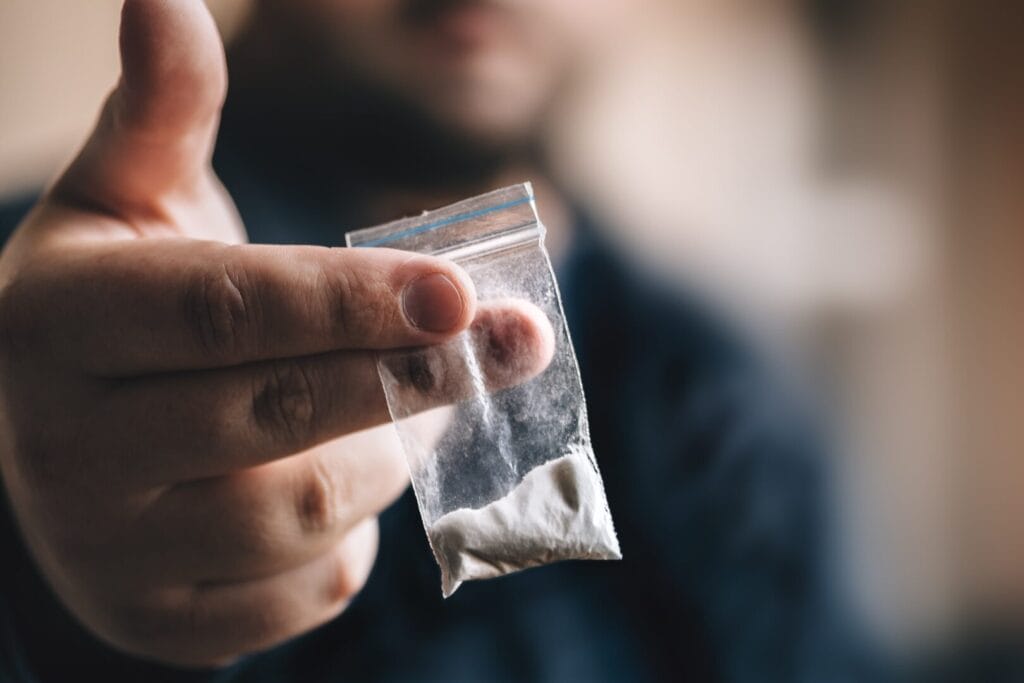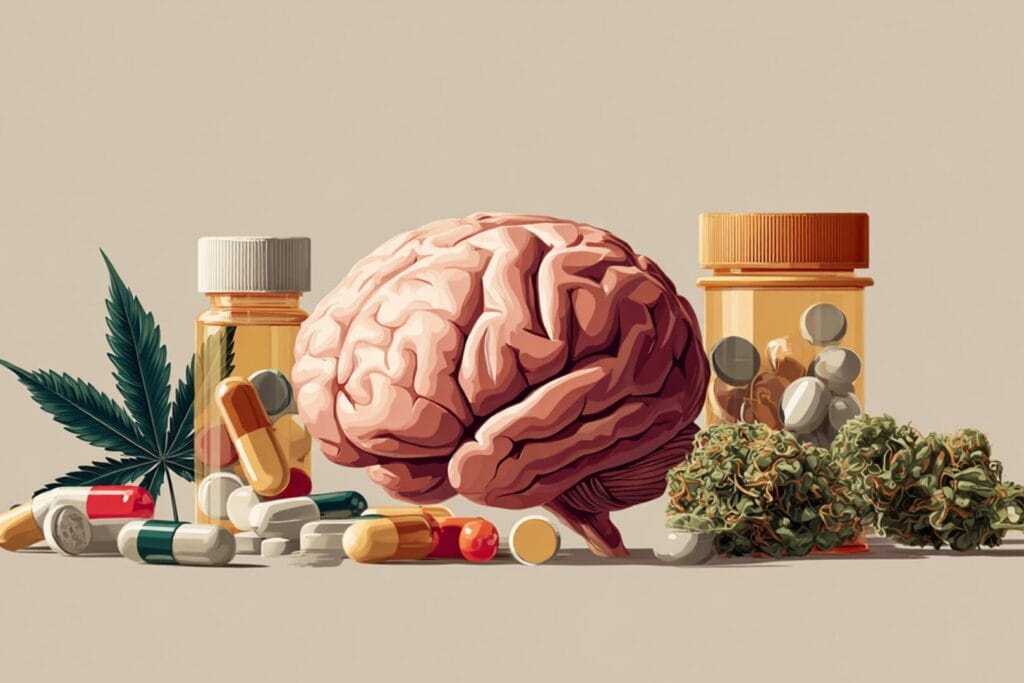What Is Cocaine?
Cocaine is a powerfully addictive drug that is derived from coca or prepared synthetically, used as an illegal stimulant, and sometimes used medicinally as a local anesthetic. The drug speeds up messages traveling between the brain and body and can have serious harmful effects on overall health and well-being. Cocaine comes from the leaves of the coca bush (Erythroxylum coca), native to South America.
People who use cocaine describe a feeling of alertness, power, and energy. They are likely to feel more confident and excited, and they may also experience anxiety, paranoia, and agitation. The period after the effects of the cocaine have worn off can also be physically and psychologically unpleasant.
The Effects of Cocaine
Cocaine has a very powerful stimulating effect on the nervous system. It raises levels of dopamine, a neurotransmitter linked to pleasure, movement, and the brain’s reward circuit. Normally, neurons release dopamine in response to a pleasurable stimulus, such as the smell of good food. Once the dopamine has passed on its message, it returns to the neuron, and the signal stop.
Cocaine prevents dopamine from getting back into the neuron, so it accumulates and continues to send a pleasurable message to the brain. The excess dopamine gives the user a feeling of enhanced well-being, euphoria, alertness, motor activity, and energy.
What Are the Short-Term Effects of Cocaine?
Cocaine is a fast-acting drug and can produce an immediate and intense effect on the body. Some of the most immediate and short-term effects of cocaine usage include, but are not limited to:
- Constricted blood vessels
- Dilated pupils
- Increased body temperature, heart rate, and blood pressure
- Bizarre, erratic, and sometimes violent behavior
- Restlessness, irritability, anxiety, panic, and paranoia
Implications of Cocaine Consumption
Because cocaine is a local anesthetic, it causes numbness of the throat and tongue when snorted, of the mouth when smoked, and of the injection site if injected. The effects generally last between ten to thirty minutes, though how quickly these effects are experienced depends on the mode of administration.
Cocaine use raises body temperature, blood pressure, and heart rate. Thus, the use of large amounts can lead to overheating, strokes, and heart attacks, which can be fatal.
How Is Cocaine Detected?
When an individual ingests cocaine, the body begins to break it down into substances called metabolites. Metabolites remain in the system for an extended period of time, and they can be detected by tests used to find cocaine in the body system.
Types of Tests for Cocaine Addiction
Cocaine can be detected in blood, hair, saliva, and urine.
Blood Test
Blood analysis may be appropriate in situations when a person is suspected of being under the influence of drugs or alcohol. Since drugs are rapidly metabolized and eliminated from the body, blood analysis offers a very brief detection window. Drugs in the blood are typically detectable within minutes, depending on the drug and the dose, versus one to several days in urine.
Hair Test
A hair follicle test screens for illicit drug use and the misuse of prescription medication. During this test, a small amount of hair is removed from the head using scissors. The sample is then analyzed for signs of drug use during the ninety days preceding the test. During testing, the collected hair is washed and tested for environmental contamination that could change the results of the test. Your results will be affected if you wash your hair, dye your hair, or use a styling product.
Saliva Test
Detection times for oral fluid saliva drug testing depends on the type and brand of saliva drug test kit used and the drug that is being tested for, but as a general rule, drugs are usually only detectable on a saliva drug test for up to 48 hours after last use.
An oral saliva drug test can be performed at any time of day but must be at least twenty minutes after the individual last ate, drank, smoked, or put anything in their mouth. The saliva drug test is performed using a mouth swab drug test kit that is then either inserted into a container with an inbuilt drug screen, or the mouth swab is built into the drug test kit.
Urine Test
Urine tests may test for cocaine itself or its metabolite, benzoylecgonine. A urine test can directly test for cocaine for a day or less but will detect cocaine metabolites for one to two days. Prolonged use, large doses, and very pure cocaine may have a slightly longer detection window.
Determining Factors of Cocaine Staying in Your System
There are a variety of factors that can contribute to how long cocaine can be detectable in your system. Factors that affect how long cocaine could stay in the body include:
- Drug use history
- Genetics
- Health & pre-existing conditions
- Duration and frequency of cocaine use
Symptoms of Cocaine Addiction
There is a wide variety of symptoms of cocaine addiction that can range from mild to severe. Some of the most obvious symptoms of cocaine addiction to look for include:
- Anxiety
- Panic attacks
- Insomnia
- Psychosis
- Paranoia
- Intense mood swings
Cocaine Addiction Rehab With San Diego Detox
Recovery from cocaine addiction is achievable, and the professionals at San Diego Detox are here to help. The typical recovery program will follow the steps detailed below.
Detox for Cocaine
Medical detox is the safest treatment for cocaine. If any complications or severe cocaine withdrawal symptoms arise, individuals will be closely monitored and treated in our professional setting.
Rehabilitation
Treatment programs for cocaine addiction typically focus on remaining drug-free and resuming function within social, professional, and family responsibilities.
Our fully licensed residential facility is available to structure a 24-hour care program, provide a safe housing environment, and supply any necessary medical interventions or assistance.
Therapies
We offer different treatment therapies like cognitive behavioral therapy to help you maintain recovery. Therapy is essential for developing a healthy and positive lifestyle to ensure long-term sobriety and prevent relapse.
Aftercare
Recovery from cocaine addiction does not end after rehabilitation. We offer an aftercare program that is just as important as detoxification and rehabilitation so that you or your loved one can make a full recovery.
Finding Treatment for Cocaine Addiction at San Diego Detox
If you or someone you know is struggling with an addiction to cocaine and are ready to seek treatment, San Diego Detox is here to help. San Diego Detox has a safe and well-equipped facility with a highly-trained staff in place to help you begin the recovery process from cocaine addiction.
Contact San Diego Detox today for more information.
Resources
- https://adf.org.au/drug-facts/cocaine/
- https://www.medicalnewstoday.com/articles/234239#treating-addiction
- https://drugpolicy.org/drug-facts/cocaine/what-cocaine-feels-like
- https://www.healthline.com/health/hair-follicle-drug-test#cost
- https://www.ukdrugtesting.co.uk/pages/saliva-drug-test-faq
- https://www.medicalnewstoday.com/articles/how-long-does-cocaine-stay-in-your-system#metabolization
Frequently Asked Questions
Cocaine and its primary metabolite (Benzoylecgonine) can typically be found in urine for 1 to 3 days after last use in occasional users, but in heavy or chronic users the detection window may stretch to up to 4 days or more.
Cocaine itself is rapidly metabolized, so a blood test may detect it for only 12 to 48 hours after use; beyond that, most detection relies on metabolites rather than the parent drug.
Multiple factors influence detection time, including: how frequently you’ve used cocaine, the dose and purity of the drug, your metabolism and body composition (weight/liver/kidney function), method of use (snorting vs smoking vs injection), and whether you used other substances (e.g., alcohol).
San Diego Detox offers a medically supervised detox program followed by residential rehabilitation, multiple therapies (such as cognitive behavioral therapy), and aftercare support—providing a structured environment, 24-hour care, and professional interventions designed to support long-term recovery from cocaine addiction.







